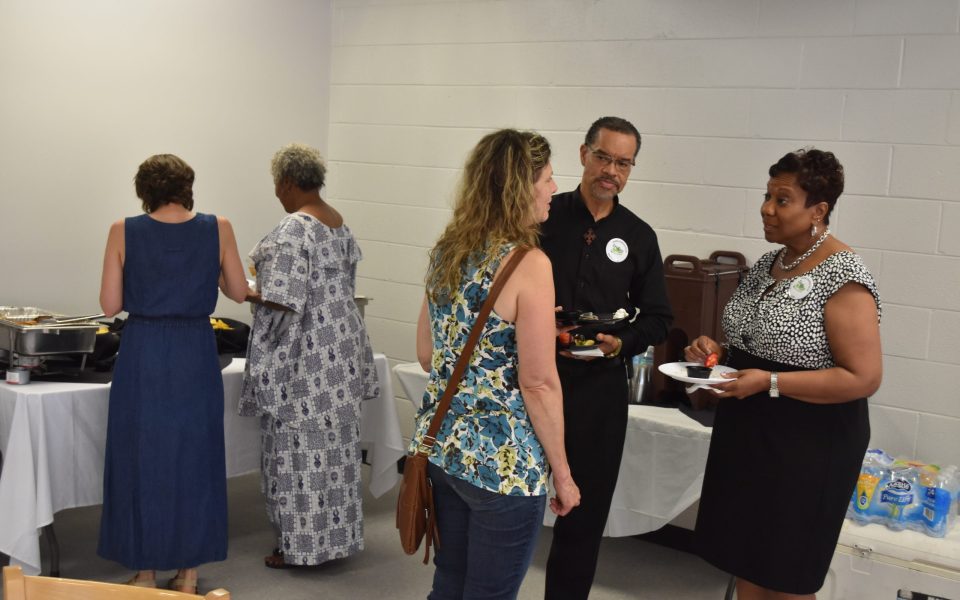Modeled on Renaissance Community Cooperative in Greensboro, organizers of SHARE in Winston-Salem are undertaking an ambitious plan to open a cooperative grocery on Peters Creek Parkway in the fall of 2018.
Plans for a cooperative grocery to address food scarcity in Winston-Salem took a step forward this week as consultants from Minnesota launched a feasibility study to determine whether the community can support the venture.
SHARE, which stands for “Supplying Honest and Respectful Engagement,” held an open house at its temporary office in the West Salem Shopping Center on April 29, next door to the retail space earmarked for the future store. And on Monday, Dakota Worldwide, a Minneapolis-based market research firm, commenced a feasibility study with funds from a $21,800 seed grant from the city of Winston-Salem. Part of the grant will also finance a plan for developing a governance structure.
The organizers are moving on an aggressive timetable, with plans to open the store in the fall of 2018. SHARE is closely modeled after the Renaissance Community Cooperative, which opened in northeast Greensboro last November after five years of planning. The two men behind SHARE hope that by studying the model in the neighboring city, they can accelerate progress on the Winston-Salem store.
“We are determined not to reinvent the wheel,” said Gary Williams, the project coordinator. “We want to be the hub and spoke for that, identifying where food can come from and where we can serve this food in the community and distribute the food in the community, particularly in communities of need.”
Williams and the Rev. Willard Bass, the founding partner, have already met with representatives of Triad Buying Co-op, a Winston-Salem-based organization that sources local dairy, produce and bread, and could potentially act as a supplier for the planned retail store.
Williams and Bass envision SHARE as a retail extension of Triad Buying Co-op that could leverage the latter entity’s buying power to achieve efficiencies of scale and pass on cost savings to consumers. The proposed location — on a commercial corridor more than a half mile south of BB&T Ballpark and sandwiched between the West Salem and Ardmore neighborhoods — straddles two Census tracts officially designated as food deserts by the US Department of Agriculture. Yet wide swaths of the city’s north end and the southeast down to the Davidson County line are also food deserts, and Williams and Bass recognize they need buy-in from the entire city to make the project work.
“For the people who don’t have access, the service we’ll provide is transportation and delivery services,” Bass said.
“It is a traditional storefront,” he added, “but we’re thinking the opportunity is developing an alternative distribution network to smaller entities.” As an example of the collaborative nature of the project, Bass said the food cooperative might be able to pass on ingredients to food trucks at a lower cost than their traditional suppliers.
“We are really attempting to do something that has far-reaching ramifications,” Bass said. “We want this to be something the community as a whole participates in. It’s almost a given that folk around the store will be the primary customers. The idea of this is to exhibit a culture of change and inclusivity. We have a culture of division in this city that we want to transcend.”
Bass said the estimated cost to launch the co-op runs between $2.3 million and $2.5 million. They plan to launch a membership drive in about six months, with a goal of raising $750,000. The remainder of the funding will likely have to come from governmental sources and foundations, they said. The goal is for the cooperative to eventually pay for itself.
“It will be self-sustaining,” Williams said. “It will be profitable. It will earn a profit, and it will be reinvested back into the Winston-Salem community.”
Yet to be determined are logistical considerations like how much of day-to-day operations will be handled by paid staff versus volunteers. Williams and Bass said they’re at the beginning stages of a “customer discovery process” to determine what local residents want from a cooperative grocery. From early conversations, so far they’ve heard that affordability, healthy offerings and wide selection are important.
“It will require knocking on some doors,” Bass said. “We want some people identified as community advocates going to door to door. We’re also looking for liaisons. These will be people from the community that we’ll recruit to serve as spokespersons for the community.”
Williams added, “We’ve gotten very favorable feedback. We’re in the process of creating a more formal process of community-based participatory research. We’re going to ask: What are the needs of the community? What would you like to see the response to that need look like? This whole thing is very collaborative.”
Join the First Amendment Society, a membership that goes directly to funding TCB‘s newsroom.
We believe that reporting can save the world.
The TCB First Amendment Society recognizes the vital role of a free, unfettered press with a bundling of local experiences designed to build community, and unique engagements with our newsroom that will help you understand, and shape, local journalism’s critical role in uplifting the people in our cities.
All revenue goes directly into the newsroom as reporters’ salaries and freelance commissions.


Leave a Reply